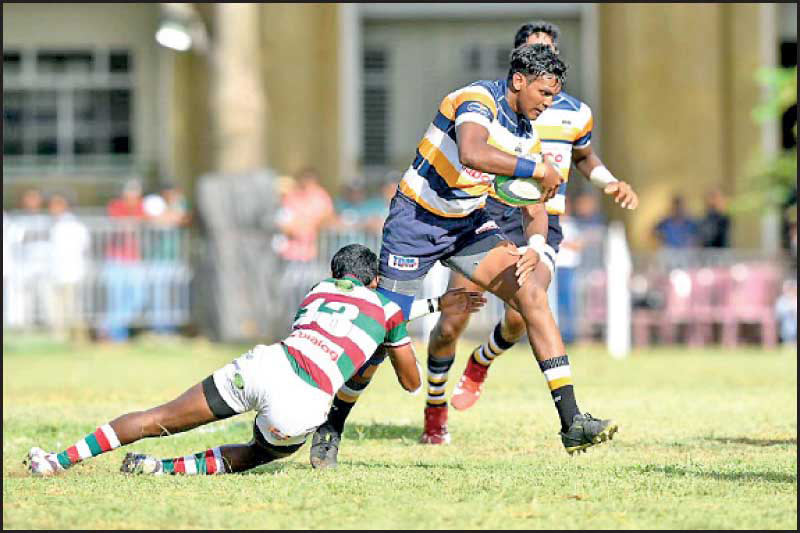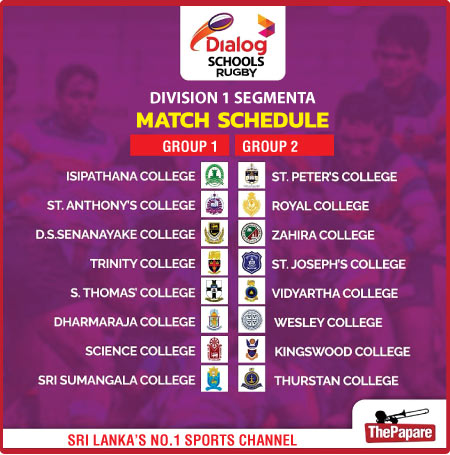Monday Feb 16, 2026
Monday Feb 16, 2026
Monday, 8 April 2024 00:08 - - {{hitsCtrl.values.hits}}

 Since the dawn of the New Year, anticipation towards the next Schools Rugby season has been mounting month-on-month amongst the devout followers of the game. With 16 teams playing in ‘Segment A’ this season, excitement has elevated with the expectation that the new entrants would ‘rock the boat’, just like DS and Zahira last season.
Since the dawn of the New Year, anticipation towards the next Schools Rugby season has been mounting month-on-month amongst the devout followers of the game. With 16 teams playing in ‘Segment A’ this season, excitement has elevated with the expectation that the new entrants would ‘rock the boat’, just like DS and Zahira last season.
The two league groups would consist of 8 teams each, and therefore each team shall play 7 games in the preliminary round, and this would indeed be a bit of a step-up since last year, where nearly half of the schools played only 6 games for the whole season. Ideally, this should climb up to 10 in the subsequent years, as the Schools Rugby Association reconvenes and stabilises following the aftermath of the pandemic.
Nevertheless, the organisers have proposed a significant change to the Super Round this season! The top two teams from each group shall enter the Super Round as usual; however, the Super Round fixtures shall be played as knockouts, comprising 2 semi-finals and a grand finale.
This change would surely excite neutral spectators, as, in fact, many enthusiasts were yearning to see yet another clash between St. Peter’s and Royal at the end of the 2023 league, something that could never happen in a traditional league. Leaving out the exponential excitement ignited by this change in the minds of neutral Rugby fanatics, one must not be hesitant to explore the adverse effects that could be caused by it; to the tournament, its core purpose, and most importantly the players.
 Traditionally, the terms “league” and “knockout” were set distinctly apart; thus, school tournaments were either structured one way or the other, while it was not uncommon to find a particular sport being played in both formats within a season. While Schools Rugby is already being played in both formats annually, it seems rather odd to include a knockout round within the league, quite as much as to conduct a set of round-robin games within a knockout tourney. While pondering on these fundamentals, one should be careful not to confuse School Tournaments with World Cups or other international competitions, as the latter’s primary motive is to maximise monetary gains, as opposed to structuring the competition to hand the trophy to the team that performed the best throughout and overall.
Traditionally, the terms “league” and “knockout” were set distinctly apart; thus, school tournaments were either structured one way or the other, while it was not uncommon to find a particular sport being played in both formats within a season. While Schools Rugby is already being played in both formats annually, it seems rather odd to include a knockout round within the league, quite as much as to conduct a set of round-robin games within a knockout tourney. While pondering on these fundamentals, one should be careful not to confuse School Tournaments with World Cups or other international competitions, as the latter’s primary motive is to maximise monetary gains, as opposed to structuring the competition to hand the trophy to the team that performed the best throughout and overall.
The Sri Lanka Schools Rugby Football Association (SLSRFA) has faithfully and consistently preserved the authenticity and dignity of the league in the past by facilitating the very best team to clinch the trophy. Introducing a knockout round may allow a less deserving team to win the title, which is not only unjust, but it could demoralise the better-performing teams and diffuse their aspirations in the subsequent seasons.
In addition to diluting the fundamentals of the league, we may have some other concerns as well. Taking some classic examples from last season’s Super Round finalists, St. Peter’s was unbeaten at the beginning of the Super Round, whereas Royal had lost two games. Had the newly proposed knockout format been in effect, then Royal and Peter’s would have met again at the final, after winning their first two Super Round games. One could observe several problems here.
Firstly, Royal could have won the cup despite losing 2 games, to Peter’s 1 loss at the final, and regardless of Peter’s higher aggregated points in the points table. One amusing outcome is that Peter’s would have had to beat Royal twice in order to win the league, which sounds quite bizarre on its own. After losing its first Super Round game, Isipathana still had the chance of clinching the title when it met Peter’s at the second game in the Super Round. The proposed format prevents such a possibility, which must prevail in a league. The two losing teams of the Super Round would end up playing one less match than they rightfully earned to play.
It is true and accepted that things have to change with times, and for the better, and Rugby as a game has evolved so much over the past decades, primarily focusing on player welfare, and secondarily on the enjoyment of the game. Changes that affect players cannot be done abruptly but should be planned at least a year ahead, discussed with relevant school authorities, and carried out with minimal impact on the development of the sport. Hence, all changes to the formats of the tournaments, or even to consider merging the present two, could be done under sensible and controlled protocols that would be acceptable to the chief stakeholders.
When we reflect on all the entities that are part of this great and historic extravaganza such as the tournament organisers, the match officials, the coaching staff, the schools, the sponsors, the spectators, and the media, the players are the most paramount, integral, and sensitive part of it. Thus, all changes or decisions that are made should ensure the welfare of the schoolboys and their development.
Just as the gentlemen who have governed SLSRFA in the past holding the aforementioned values at the centre of their hearts, the hopes of the Rugby enthusiasts are that these values be passed down to their successors without failure.